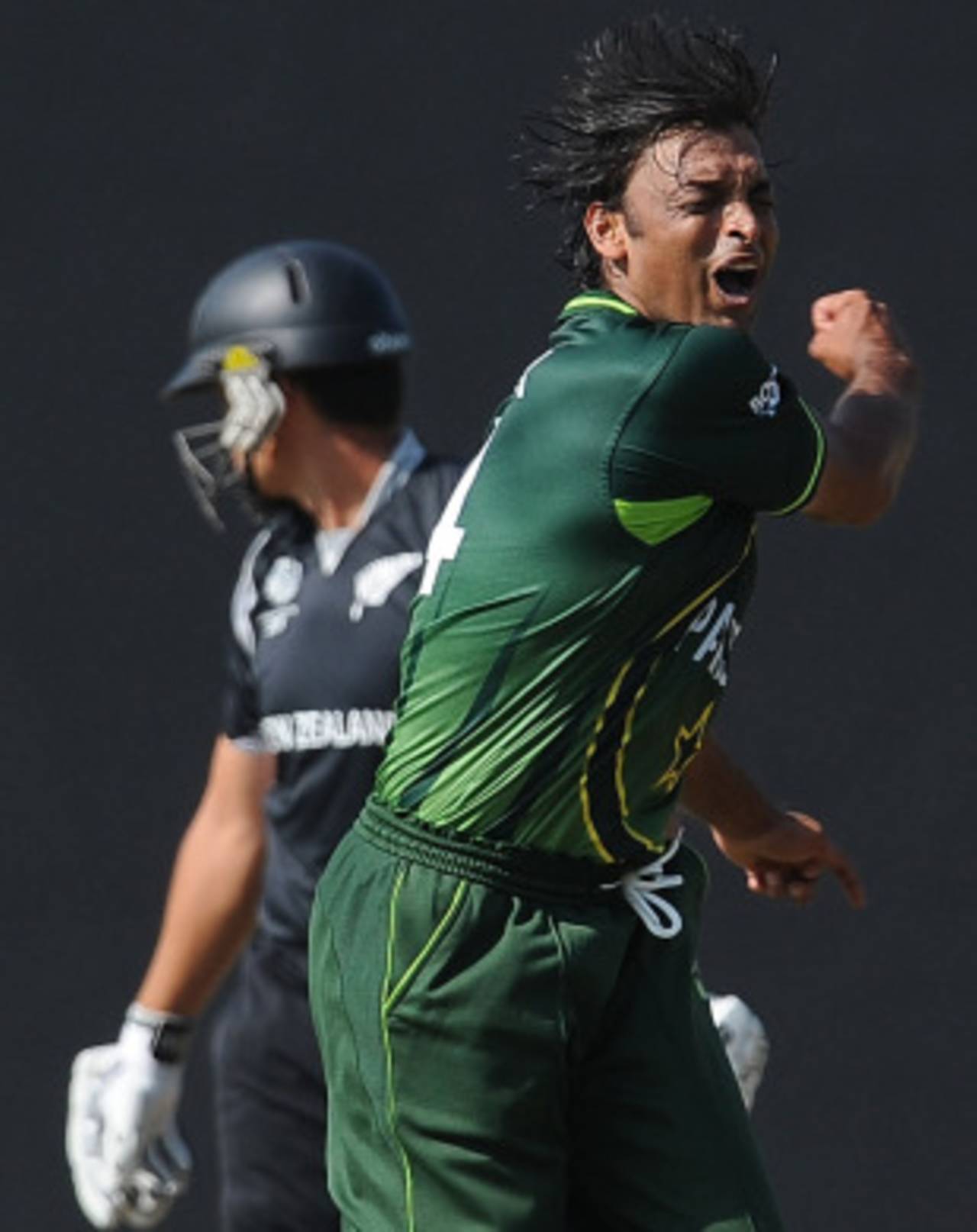It's the colour we remember, Shoaib
Over 13 years Shoaib Akhtar played too few Tests, had too many injuries, got into too much trouble but left behind indelible memories
Osman Samiuddin
17-Mar-2011

Even the World Cup, his swansong, has not been without incident for Shoaib Akhtar • Associated Press
Eventually we all get old and the bad times matter less. The last year of Shoaib Akhtar's career has held this one truth of life in it. There have been the usual disciplinary scrapes till the very end. In this World Cup alone, he has been the single biggest contributor to the team kitty of fines; usually for harmless breaches of curfew but also once for a scrap with Kamran Akmal after the Ross Taylor drops.
But something about Shoaib over the last year or so has somehow placed him in a different light. Maybe it's because he has been in the spotlight less than he once used to be. It has been good for him. Maturity might not be the right word; an expansion of the mind is probably a better way of putting it. With no other cricketer in the current side can you have, for example, a conversation about the troubles that ail Pakistan the country, not the cricket. There are some moments when he veers into spheres inhabited by cranks, but many reasoned ones also, words and thoughts of a man who has travelled the world and taken it in, not kept it out as so many of Pakistan's players have.
He was never a monster really, though it wasn't either simply that he was misunderstood. His private life should always have remained his private life but he retains the self-obsession of most celebrities, which make precisely that a difficult balance to achieve. He speaks regularly of how difficult it is for him to live a regular life in Pakistan. He probably doesn't want it any other way.
Perhaps he has just come to terms with not being able to do what he used to, not being who he once was. Even the run-up was shortened last year in the Asia Cup, in his most improbable comeback ever, something he would have considered an affront to his masculinity just two years ago. He even told a tale recently of offering advice to Mohammad Amir two years ago on how to cope with what was about to happen to his life. Amir didn't take it up apparently and who would've blamed him: Shoaib Akhtar, the role model for adjusting to celebrity, doesn't quite work.
But if you look now at what Amir has done and scour through the worst episodes of Shoaib's life, you can only be reminded of what the noted Pakistani writer Nadeem Farooq Paracha pointed out once. Corruption in Pakistan cricket has tainted all kinds of men including some who cloak it with great righteousness and morality. It is not the least of Shoaib's achievements that for everything he has done, he has never done this, as he pointed out repeatedly in his farewell. An obsessive, clingy patriotism drove him in this regard and it still does.
This is all necessary to record because increasingly the man Shoaib is at least as, if not more, compelling than the cricketer Shoaib. The story of his cricket is well-formed, but hollow. Surgeons across the world are richer for him, as are lawyers, but not spectators and his teams, who didn't get enough. Over 13 years he has only 46 Tests to show, missing almost as many as he played. He was a fabulous sight and a fine bowler, much smarter and better rounded than the image he himself created and encouraged, of the fastest bowler on the planet.
He will be missed as a cricketer, but equally as man, as character, as the very colour that cricket, and professional sport, needs because eventually, when we get old, it's the colour we remember.
There was nothing sustained about it, peaks occurring suddenly and randomly so that the memories are bright still: Kolkata, the 1999 World Cup, Colombo against the Australians, the 2005-06 England series to name a few. They are just not as plentiful.
If we weren't satisfied, he said he was, "with a few exceptions." Who are we to disagree with that? Only he knows what he has gone through to get to where he is at, and as a life all told, he is right to consider it successful. He spoke so honestly and touchingly of how playing for Pakistan was such a dream, of how cricket changes a young man's life entirely in Pakistan - "we learn swimming, driving, anything you name it we learn from there [cricket]" - that you are reminded how much a single Test, let alone a 13-year career, means. Everything else "was written in my life and it had to happen."
His body has now given up. Yet in the last year he has put together the second-longest unbroken sequence of ODI appearances of his career. That has come from nothing but spirit, because each over takes more out of him. He hasn't bowled badly at all, the brain taking over fully; as in life, so too in cricket. He may or may not play again and it will be a shame if that 28-run over of tired full tosses is the last one he bowls.
He will be missed as a cricketer, but equally as man, as character, as the very colour that cricket, and professional sport, needs because eventually, when we get old, it's the colour we remember.
Osman Samiuddin is Pakistan editor of ESPNcricinfo